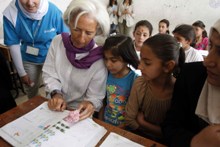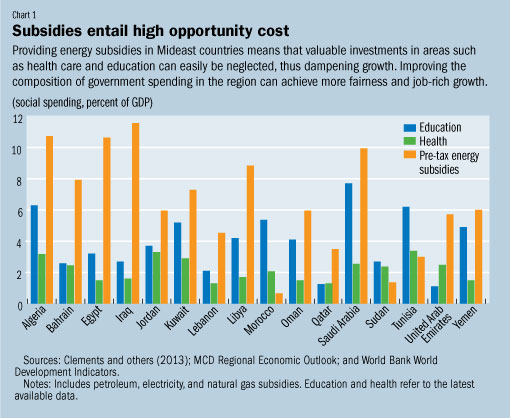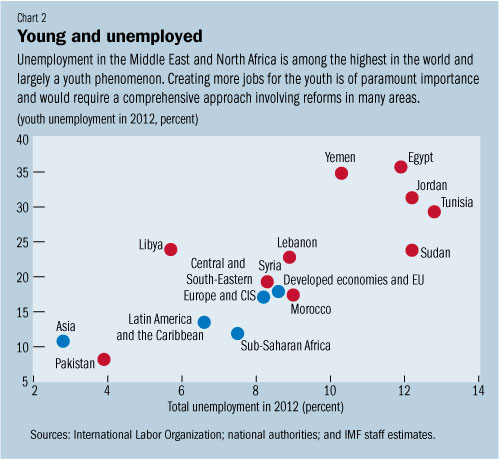
Typical street scene in Santa Ana, El Salvador. (Photo: iStock)
IMF Survey : Jobs, Growth, Fairness Top List of Priorities for Arab Countries
May 16, 2014
- Amman conference airs diverse views on way forward for region
- Priorities include creating jobs, improving business climate, enhancing governance
- Reform agenda to be taken forward by each Arab country in transition
Tackling youth unemployment and reorienting public spending to promote inclusive growth are two of the most urgent priorities for the Arab countries in transition, participants tell a regional conference in Amman, Jordan.

IMF’s Lagarde with Syrian refugee students at Alimate school in Al Mafraq city, Jordan. Mideast countries need education systems that lead to productive jobs for the young (photo: Ali Jarekji/Newscom)
Amman Conference
Nearly 300 senior policymakers, private sector representatives, civil society, academics, and media gathered in Amman on May 11-12 to discuss the main elements of an economic vision for the region. More than three years since the onset of fundamental economic and political transitions in many countries in the Arab world, economic stabilization is underway, but the challenge now is to move from stabilization to growth.
Participants debated issues in four main areas: how to achieve macroeconomic stability in the region, create more jobs for the young, improve the business climate, and enhance transparency and governance in both the public and private sectors.
While each country faces its own unique challenges, participants acknowledged, a common policy priority across the region is to boost employment, especially among the young.
“The growth that the region is seeing, at about 3 percent, would have to significantly increase in order to respond to the demands of a youth population that is waiting to join the job market,” IMF Managing Director Christine Lagarde told the gathering.
Challenges of transition
Jointly organized by the IMF, the government of Jordan, and the Arab Fund for Economic and Social Development, the conference opened with a day of workshops designed to gather participants’ views on the main topics of the conference. After a discussion, the audience was asked to vote on their top three policy priorities for each. The results were then generated through an electronic voting mechanism. On the second day, panels comprising ministers of finance and economy and central bank governors from the region discussed these priorities and possible policy solutions.
In the opening session on the challenges of economic transitions in the Arab economies, Jordanian Prime Minister Abdullah Ensour discussed his own country’s experience with reform. He attributed the success of Jordan’s reforms in part to the fact that the government was honest with the people and sought their buy-in, allowing it to gain credibility. “We gave the people the facts, both bitter and sweet,” Ensour said.
Lagarde agreed that government honesty and credibility were key, especially with regard to such sensitive topics as subsidy reform. When reducing generalized subsidies to make room for more targeted spending, clear communications are crucial, she said. “You are only credible if you are transparent and accountable for what you do with public money. That is the best road toward sovereignty and economic independence.”
Macroeconomic policies
Panelists also discussed what the optimal package of macroeconomic policies should be for maintaining economic stability and inclusive growth. The top priority, according to the audience, was a strong and shared vision in each country to guide the economic future. Coupled with strong and effective leadership, such a vision is necessary to bring about lasting change in the Arab world, the conference heard.
Improving the composition of government spending to achieve more fairness, more efficiency, and ultimately more inclusive growth was also seen as important. Nasser Saidi, former minister of the Economy and Industry of Lebanon, noted that energy subsidies take up a significant percentage of national budgets (see Chart 1), but they do little to advance a country’s development.
“We spend more on subsidies than we spend on education, yet we have the youngest and fastest-growing populations on earth,” he said.

Good governance
Transparency and governance are areas where the region has to improve significantly, participants agreed. Governments need to establish more accountability vis-à-vis their citizens, the conference heard. This would also build credibility around their economic agendas and help attract investors.
Strengthening the judicial system was seen as the top priority for achieving good governance in the region. Libya’s central bank governor, Saddek El Kaber, observed that a weak—or absent—judicial system can have far-reaching consequences. “In Libya, our justice is delayed, and this has an adverse impact on the whole economic and social cycle.”
Panelists also noted that for improving governance in both the public and the private sector, a strong civil society would be vital. Moroccan finance minister Mohamed Boussaid spoke of his country’s central unit to combat corruption. “The role of civil society in fighting corruption is very important,” he said.
Job creation
Panelists observed that creating more jobs for the youth is of paramount importance (see Chart 2) and would require a comprehensive reform approach, including increasing the inclusion of women.

Tarik Yousef, CEO of Silatech, a regional nongovernmental organization based in Qatar, spoke about the need to change people’s concept of the state as an employer. Other reforms highlighted in the session included creating education systems that provide bridges to productive employment, designing labor market regulations that protect workers without unduly constraining employers, and establishing a business climate conducive to greater competitiveness.
Improving the business climate
Participants then focused on measures to improve the business climate and move away from a system of privileged access to a system of competition. There was strong support among participants for this agenda. Streamlining red tape for setting up firms, improving access to credit, and putting in place insolvency frameworks that are less punitive were some of the measures panelists endorsed. Several of the panelists noted the importance of entrepreneurship, saying governments should do as much as possible to ease the way for startups.
The conference generated a number of good recommendations, and participants agreed that this agenda could now be taken forward for each country, taking into account the specificities of each case. Lagarde underscored that the IMF stands ready to help, with advice, technical assistance, and financing.
In concluding remarks, Jordanian Finance Minister Umayya Toukan said, “Jordan has demonstrated that, in spite of the difficulties inherent to the reform process and in spite of the extraordinary circumstances of the Syrian crisis, reforms can be done.” But for Jordan and the other Arab countries in transition, there are still difficult times ahead, he added, and the ongoing support of the international community will be needed.







